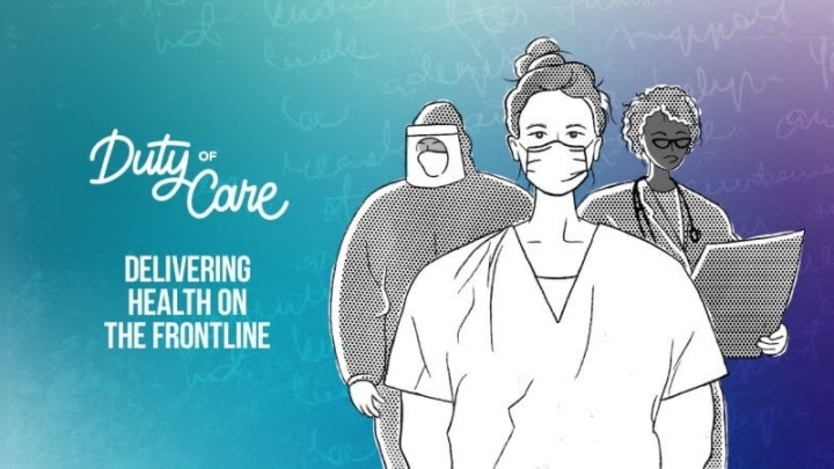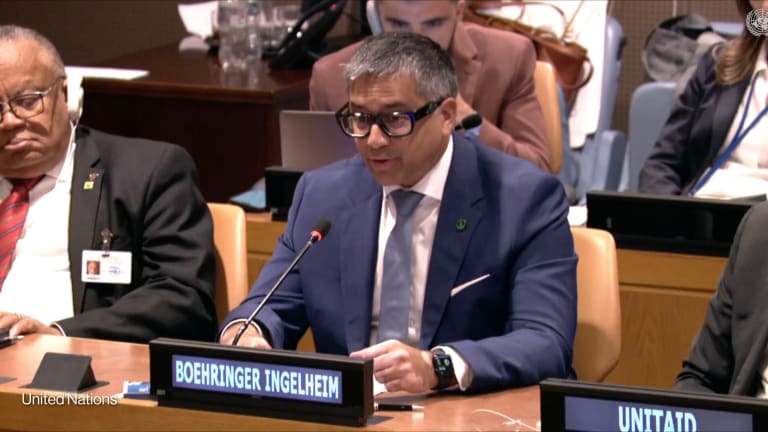
GLASGOW, Scotland — Shortages of protective equipment, long shifts, and fear of taking the virus home to their families — these are just some of the challenges facing health professionals supporting the COVID-19 response. And, while some are hailed as heroes, others face stigma from local communities who fear they could spread the coronavirus further.
Even outside of a pandemic situation, health workers face tough conditions in their jobs. But the toll this can take on their mental health is rarely discussed, and regular or immediate support is, in many cases, still lacking.
They may seem like superheroes, but doctors, nurses, midwives, and community health workers need support too. This content series takes a look at how health systems can function better so that health care workers are supported, protected, and empowered.
Alexandru Cretu, a surgical nurse with the International Committee for the Red Cross based in Goma, Democratic Republic of the Congo, told Devex that he and his colleagues are constantly attending to people who have been victims of terrible violence. “It’s difficult to see every day,” he said.
In a country that is experiencing protracted violence and an ongoing Ebola outbreak, the coronavirus has added another stressor. Cretu has received training on stress management and resilience but, as the person in charge of a mobile surgical team, he described it as a “heavy” burden to ensure that his colleagues are able to protect themselves.
For Shekhar Saxena, professor of the practice of global mental health and population at Harvard University, the current crisis has simply highlighted the mental health challenges that health workers face, which existed long before the pandemic.
“It’s not a short-term fix [that’s needed] … We need to think longer term, rather than just as a crisis response,” he said.
Some organizations are starting to recognize and address the issue. For Afi Kpaba, a community health worker supported by Integrate Health in Togo, previous training she received in stress management has allowed her to continue in her role during these challenging times.
More mental health training and capacity building is needed for health workers, though, “to better equip them and enable them to be mentally strong,” she said.
No provision
According to Saxena, the prevalence of mental health issues such as depression, and rates of suicide, is higher amongst medical professionals globally than the general population.
There is also evidence to suggest that even a small rise in the demands on health workers can lead to burnout and “depletion of experienced health care workers from the workforce,” he explained. This can be “very detrimental” to the public health care system, particularly in lower-income countries where there may already be shortages of qualified health professionals.
“Any need for mental health is seen as a weakness, as a liability.”
— Shekhar Saxena, professor of the practice of global mental health and population, Harvard UniversityIt also bodes badly for the situation after the pandemic. Among other stresses for health professionals during an emergency is the sudden change in their role. They might be recruited for the emergency response but lack the knowledge and skills for this work, which then impacts their competence and confidence, Saxena explained. On top of that is the demand for overworked staff to keep up with rapid changes to guidelines and policy.
Despite having a higher level of knowledge around mental health issues than most people, health workers often demonstrate poor health-seeking behaviors when it comes to themselves, Saxena said. This is partly due to the nature of their role and a sense of duty to help others first.
But “in some cases, employers don’t encourage them [health workers] to be conscious of their own need for self care and mental health care,” he added. They “give the message that [they] need to do [their] duties and … any need for mental health is seen as a weakness, as a liability.”
Paulin Mumbere Muthithi, a health promoter with Medair based in DRC, told Devex that the hierarchy within organizations and a lack of recognition for staff carrying out difficult work in the field can also be an issue.
There also continues to be a stigma around mental health issues, even among health workers, who may worry about the impact on their career if it is noted on their health or job record, said Umair Bachlani, an intensive care unit nurse at the Aga Khan University Hospital in Karachi, Pakistan.
Rethinking mental health support
While the issue has historically been overlooked, the current crisis has got people thinking more about mental health support and alternative ways of delivering this, rather than just the traditional in-person interventions, Saxena said. In low- and middle-income countries, where there is growing access to the internet and smartphones, web and app-based assistance has the potential to reach more health professionals.
These methods are helpful but have limitations, Bachlani said. As a mental health facilitator who supports his colleagues on these issues, he feels focus groups that encourage conversations around mental health and peer support are still hugely important. Cretu suggested that having a mental health focal point in the field and dedicated to staff is also something that many humanitarian organizations could consider. While ICRC does have a team of doctors charged with looking after staff, there can be a lack of formal mental health expertise on the ground.
But interventions, whether tech-based or traditional, aren’t always enough to address the root causes of mental health issues for frontline professionals. Employers, including governments and health-focused organizations, need to place greater value on protecting staff mental health in the first place, Saxena said.
Kpaba called on employers to be more vigilant of safety, especially in times of crisis and when staff are working in volatile security situations. Meanwhile, her colleague, Isaac Mathe Cheki, also a community health worker in DRC, suggested that improving the salary and benefits packages of frontline workers, and providing more secure contracts, would alleviate some of the mental burden.
Visit the Duty of Care series for more coverage on how health systems can function better so that health care workers are supported and protected. You can join the conversation using the hashtag #DutyOfCare.









